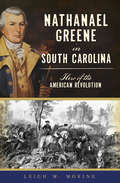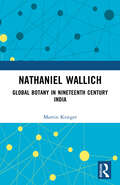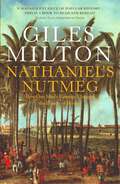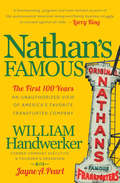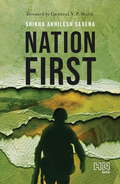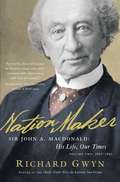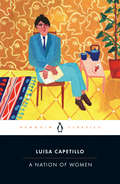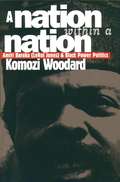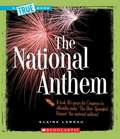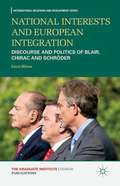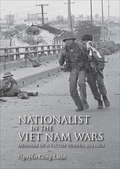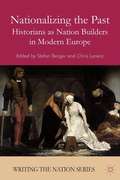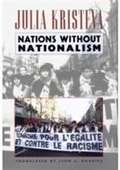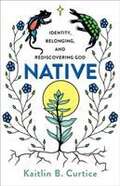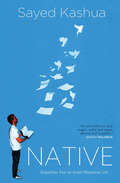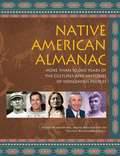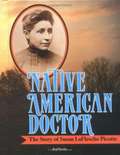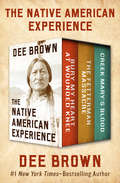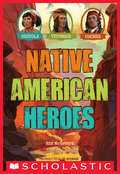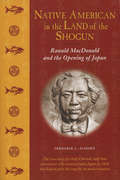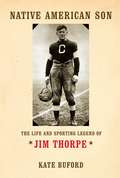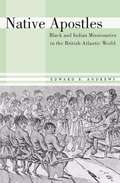- Table View
- List View
Nathanael Greene in South Carolina: Hero of the American Revolution (Military)
by Leigh M. MoringIn December 1780, former Quaker turned general Nathanael Greene took command of the entire Southern Department. He reported only to George Washington himself. Leadership of the southern states to that point in the American Revolution had failed, as the British held all major southern cities, including the important port city of Charleston. Greene faced the British in several key battles in South Carolina in 1781 and ultimately was able to rid the state of the British and free Charleston, but not until 1782, long after the victory at Yorktown. Join author and historian Leigh Moring as she tells the forgotten story of General Nathanael Greene and the liberation of the Lowcountry at the end of the American Revolution.
Nathaniel Hawthorne (The American Men of Letters Series)
by Mark Van DorenA brief but cogent biography.
Nathaniel Wallich: Global Botany in Nineteenth Century India
by Martin KriegerIn March 1807, Nathaniel Wallich, a young Danish surgeon left his home in Copenhagen towards India. During the troubles of the Napoleonic Wars, it was not possible to foresee, that he was to emerge as one of the most prominent nineteenth century botanists. Wallich spent most of his adulthood in India and, as the long-time superintendent of the Calcutta Botanic Garden, gained extensive expertise on Indian flora. A truly global communication network emerged from his desk facing the River Hooghly, reaching out to eminent specialists as well as amateur researchers long forgotten today. He conducted research trips to Nepal, as well as to South East Asia and may be perceived as one of the founding fathers of tea production in Assam. This book is based on the enormous correspondence of Wallich, preserved in libraries across Calcutta, London, Copenhagen, Hamburg, Munich and many other places. It aims to approach a long career marked by biographical ruptures and contradictions, but at the same time by continuity. It furthermore explains the tight links between supposedly neutral botanical studies and the emergence of British colonial power in India.
Nathaniel's Nutmeg: How One Man's Courage Changed the Course of History
by Giles Milton'To write a book that makes the reader sit in a trance, lost in his passionate desire to pack a suitcase and go to the fabulous place - that, in the end, is something one would give a sack of nutmeg for' Philip Hensher, The SpectatorIn 1616, an English adventurer, Nathaniel Courthope, stepped ashore on a remote island in the East Indies on a secret mission - to persuade the islanders of Run to grant a monopoly to England over their nutmeg, a fabulously valuable spice in Europe. This infuriated the Dutch, who were determined to control the world's nutmeg supply. For five years Courthope and his band of thirty men were besieged by a force one hundred times greater - and his heroism set in motion the events that led to the founding of the greatest city on earth.A beautifully told adventure story and a fascinating depiction of exploration in the seventeenth century, NATHANIEL'S NUTMEG sheds a remarkable light on history
Nathaniel's Nutmeg: How One Man's Courage Changed the Course of History
by Giles Milton'To write a book that makes the reader sit in a trance, lost in his passionate desire to pack a suitcase and go to the fabulous place - that, in the end, is something one would give a sack of nutmeg for' Philip Hensher, The SpectatorIn 1616, an English adventurer, Nathaniel Courthope, stepped ashore on a remote island in the East Indies on a secret mission - to persuade the islanders of Run to grant a monopoly to England over their nutmeg, a fabulously valuable spice in Europe. This infuriated the Dutch, who were determined to control the world's nutmeg supply. For five years Courthope and his band of thirty men were besieged by a force one hundred times greater - and his heroism set in motion the events that led to the founding of the greatest city on earth.A beautifully told adventure story and a fascinating depiction of exploration in the seventeenth century, NATHANIEL'S NUTMEG sheds a remarkable light on history
Nathan's Famous: An Unauthorized View of America's Favorite Frankfurter Company
by Jayne A. Pearl William Handwerker“A heartwarming, poignant and even-handed account of the quintessential American immigrant/family business struggle to succeed against all odds” (Larry King). Nathan’s Famous chronicles the history and business strategies of company founder Nathan Handwerker that led to the success of an iconic international brand and two of America’s most loved foods: the Nathan’s Famous Frankfurter and Crinkle-cut French Fries. Brimming with photos of historic Coney Island, New York, Nathan’s Famous restaurants, and intimate family memories of author, former company Senior Vice president and grandson William Handwerker, Nathan’s Famous details entrepreneurial spirit, business lessons, dramatic corporate missteps and growth. William includes insights into three generations of the Handwerker family, beginning with the founder’s early life, growing up in extreme poverty in Galicia, Poland, as well as his own sons and grandson who contributed to expanding geographic locations, menu and the overall brand. Nathan’s may have started as a small hot dog stand in 1916, but by sticking to his philosophy to “give ’em and let ’em eat,” he was able to beat his competition by providing top quality food at low prices. Nathan’s Famous reveals the successes, trials and tribulations of growing Nathan’s original vision into the international frankfurter corporation it is today.
Nation Builder: John Quincy Adams and the Grand Strategy of the Republic
by Charles N. EdelAmerica's rise from revolutionary colonies to a world power is often treated as inevitable. But Charles N. Edel's provocative biography of John Q. Adams argues that he served as the central architect of a grand strategy whose ideas and policies made him a critical link between the founding generation and the Civil War-era nation of Lincoln.
Nation First
by Shikha Akhilesh SaxenaTwo decades after India's resounding victory at Kargil, stories and accounts of the war continue to be narrated with immense pride. Yet, one pertinent perspective has been largely overlooked - that of the army wives. In this remarkable book, Shikha Akhilesh Saxena, wife of artillery officer Captain Akhilesh Saxena, describes the turmoil endured by the families of military officers in the face of conflict.As a young couple, Shikha and Akhilesh unexpectedly found themselves in the midst of war. Shikha deftly depicts her own experiences as well as those of Akhilesh, who took part in missions at Tololing, the Hump and Three Pimples. What does a soldier go through, when marching off to a near-suicidal mission? And what does it take to survive, even thrive, having sustained serious injuries in battle? This detailed memoir shows the boundless bravery of the Indian troops, as well as the emotional tumult experienced by their families both during and after the war. Nation First is a story of grit, determination and heroic patriotism shown by the men and women who give their all to safeguard the country.
Nation Maker: Sir John A. Macdonald: His Life, Our Times
by Richard J. GwynAn exciting story, passionately told and rich in detail, this major biography is the second volume of the bestselling, award-winning John A: The Man Who Made Us, by well-known journalist and highly respected author Richard Gwyn.John A. Macdonald, Canada's first and most important prime minister, is the man who made Confederation happen, who built this country over the next quarter century, and who shaped what it is today. From Confederation Day in 1867, where this volume picks up, Macdonald finessed a reluctant union of four provinces in central and eastern Canada into a strong nation, despite indifference from Britain and annexationist sentiment in the United States.But it wasn't easy. The wily Macdonald faced constant crises throughout these years, from Louis Riel's two rebellions through to the Pacific Scandal that almost undid his government and his quest to find the spine of the nation: the railroad that would link east to west. Gwyn paints a superb portrait of Canada and its leaders through these formative years and also delves deep to show us Macdonald the man, as he marries for the second time, deals with the birth of a disabled child, and the assassination of his close friend Darcy McGee, and wrestles with whether Riel should hang.Indelibly, Gwyn shows us Macdonald's love of this country and his ability to joust with forces who would have been just as happy to see the end of Canada before it had really begun, creating a must-read for all Canadians.From the Hardcover edition.
A Nation of Women: An Early Feminist Speaks Out (Recovering The U. S. Hispanic Literary Heritage)
by Luisa CapetilloThe groundbreaking feminist and socialist writings of Puerto Rican author and activist Luisa Capetillo. <p><p> In 1915, Puerto Rican activist Luisa Capetillo was arrested and acquitted for being the first woman to wear men's trousers publicly. While this act of gender-nonconforming rebellion elevated her to feminist icon status in modern pop culture, it also overshadowed the significant contributions she made to the women's movement and anarchist labor movements of the early twentieth century--both in her native Puerto Rico and in the migrant labor belt in the eastern United States. With the volume A Nation of Women, Capetillo's socialist and feminist activism is given the spotlight it deserves with its inclusion of the first English translation of Capetillo's landmark Mi opinión sobre las libertades, derechos y deberes de la mujer. <p><p> Originally published in Spanish in 1911, Mi opinión is considered by many to be the first feminist treatise in Puerto Rico and one of the first in Latin America and the Caribbean. In concise prose, Capetillo advocates a workers' revolution, forcefully demanding an end to the exploitation and subordination of workers and women. Her essays challenge big business in favor of socialism, call for legalizing divorce and the acceptance of "free love" in relationships, and cover topics such as sexuality, mental and physical health, hygiene, spirituality, and nutrition. At once a sharp critique and a celebration of the gathering fervor of world politics, A Nation of Women embraces the humanistic thinking of the early twentieth century and envisions a world in which economic and social structures can be broken down, allowing both the worker and the woman to be free.
A Nation within a Nation
by Komozi WoodardPoet and playwright Amiri Baraka is best known as one of the African American writers who helped ignite the Black Arts Movement. This book examines Baraka's cultural approach to Black Power politics and explores his role in the phenomenal spread of black nationalism in the urban centers of late-twentieth-century America, including his part in the election of black public officials, his leadership in the Modern Black Convention Movement, and his work in housing and community development.Komozi Woodard traces Baraka's transformation from poet to political activist, as the rise of the Black Arts Movement pulled him from political obscurity in the Beat circles of Greenwich Village, swept him into the center of the Black Power Movement, and ultimately propelled him into the ranks of black national political leadership. Moving outward from Baraka's personal story, Woodard illuminates the dynamics and remarkable rise of black cultural nationalism with an eye toward the movement's broader context, including the impact of black migrations on urban ethos, the importance of increasing population concentrations of African Americans in the cities, and the effect of the 1965 Voting Rights Act on the nature of black political mobilization.
The National Anthem
by Elaine LandauIdeal for today's young investigative reader, each A True Book includes lively sidebars, a glossary and index, plus a comprehensive "To Find Out More" section listing books, organizations, and Internet sites. A staple of library collections since the 1950s, the new A True Book series is the definitive nonfiction series for elementary school readers. A True Book -- American History: How do you wrap a 450,000-pound gift? What is the world's oldest and shortest written consitution? Find out in this patriotic celebration of things uniquely American.
National Interests and European Integration
by Katrin MilzowThis study combines an account of Blair, Chirac, Schröder and their attitudes towards European integration. It analyzes political discourses on 'national interests' and the EU, the frequently debated role of political discourse, the concept of national interest, and offers an alternative point of view on intergovernmental interaction.
Nationalist in the Viet Nam Wars: Memoirs of a Victim Turned Soldier
by Nguyen Công LuanThis extraordinary memoir tells the story of one man's experience of the wars of Viet Nam from the time he was old enough to be aware of war in the 1940s until his departure for America 15 years after the collapse of South Viet Nam in 1975. Nguyen Cong Luan was born and raised in small villages near Ha Noi. He grew up knowing war at the hands of the Japanese, the French, and the Viet Minh. Living with wars of conquest, colonialism, and revolution led him finally to move south and take up the cause of the Republic of Viet Nam, exchanging a life of victimhood for one of a soldier. His stories of village life in the north are every bit as compelling as his stories of combat and the tragedies of war. This honest and impassioned account is filled with the everyday heroism of the common people of his generation.
Nationalizing the Past
by Stefan Berger Chris LorenzHistorians traditionally claim to be myth-breakers, but national history since the nineteenth century shows quite a record in myth-making. This exciting new volume compares how national historians in Europe have handled the opposing pulls of fact and fiction and shows which narrative strategies have contributed to the success of national histories. <P><P><i>Advisory: Bookshare has learned that this book offers only partial accessibility. We have kept it in the collection because it is useful for some of our members. To explore further 10access options with us, please contact us through the Book Quality link. Benetech is actively working on projects to improve accessibility issues such as these.</i>
Nations Without Nationalism (European Perspectives)
by Julia Kristeva Lawrence D. Kritzman Richard Wolin Leon S. Roudiez<p>Underlying Julia Kristeva's latest work is the idea that otherness - whether it be ethnic, religious, social, or political - needs to be understood and accepted in order to guarantee social harmony. Nations Without Nationalism is an impassioned plea for tolerance and for commonality, aimed at a world brimming over with racism and xenophobia. <p>Responding to the rise of neo-Nazi groups in Germany and Eastern Europe and the continued popularity of the National Front in France, Kristeva turns to the origins of the nation-state to illustrate the problematic nature of nationalism and its complex configurations in subsequent centuries. <p>For Kristeva, the key to commonality can be found in Montesquieu's esprit general - his notion of the social body as a guaranteed hierarchy of private rights. <p>Nations Without Nationalism also contains Kristeva's thoughts on Harlem Desir, the founder of the antiracist organization SOS Racisme; the links between psychoanalysis and nationalism; the historical nature of French national identity; the relationship between esprit general and Volksgeist; Charles de Gaulle's complex ideas involving the "nation" and his dream of a unified Europe. <p>In the tradition of Strangers to Ourselves, her most recent nonfiction work, Nations Without Nationalism reflects a passionate commitment to enlightenment and social justice. As ethnic strife persists in Europe and the United States, Kristeva's humanistic message carries with it a special resonance and urgency.</p>
Native: Identity, Belonging, and Rediscovering God
by Kaitlin B. CurticeNative is about identity, soul-searching, and being on the never-ending journey of finding ourselves and finding God. As both a citizen of the Potawatomi Nation and a Christian, the author offers a unique perspective on these topics. <p><p> In this book, she shows how reconnecting with her identity both informs and challenges her faith. Drawing on the narrative of her personal journey through poetry, imagery, and stories of the Potawatomi people, she addresses themes at the forefront of today's discussions of faith and culture in a positive and constructive way. She encourages us to embrace our own origins and to share and listen to each other's stories so we can build a more inclusive and diverse future. <p><p> Each of our stories matters for the church to be truly whole. As she shares what it means to experience her faith through the lens of her Indigenous heritage, she reveals that a vibrant spirituality has its origins in identity, belonging, and a sense of place.
Native: Dispatches from an Israeli-Palestinian Life (Books That Changed the World)
by Sayed KashuaEssays by “Jerusalem’s version of Charles Bukowski . . . Just as aware and critical—of his city, his family, Israel, the Arabs, but most of all of himself” (NPR).Sayed Kashua has been praised by the New York Times as “a master of subtle nuance in dealing with both Arab and Jewish society.” An Arab-Israeli who lived in Jerusalem for most of his life, Kashua started writing with the hope of creating one story that both Palestinians and Israelis could relate to, rather than two that cannot coexist together. He devoted his novels and his satirical weekly column published in Haaretz to telling the Palestinian story and exploring the contradictions of modern Israel, while also capturing the nuances of everyday family life in all its tenderness and chaos.With an intimate tone fueled by deep-seated apprehension and razor-sharp ironic wit, Kashua has been documenting his own life as well as that of society at large: he writes about his children’s upbringing and encounters with racism, about fatherhood and married life, the Jewish-Arab conflict, his professional ambitions, travels around the world as an author, and—more than anything—his love of books and literature. He brings forth a series of brilliant, caustic, wry, and fearless reflections on social and cultural dynamics as experienced by someone who straddles two societies. “One of the most celebrated satirists in Hebrew literature . . . [Kashua] has an acerbic, dry wit and a talent for turning everyday events into apocalyptic scenarios.”—Philadelphia Inquirer“What is most striking in these columns is the universality of what it means to be a father, husband and man.”—Toronto Star
Native American Almanac: More than 50,000 Years of the Cultures and Histories of Indigenous Peoples
by Yvonne Wakim Dennis Arlene Hirschfelder Shannon Rothenberger FlynnA primer on the Native American experience, presenting the rich history and continuing legacy of the indigenous and tribal nations. Fascinating biographies, insightful quotes, detailed data and absorbing narratives bring the stories of indigenous people to life, delivering unique insights into the American nation. Chapters are arranged by regions of the country and each chapter ends with biographies of notable people. Also of interest are the appendices, including Appendix G, which lists English words derived from words of Native American languages (an example is barbecue) and Appendix L, which lists notable people with indigenous ancestry.
Native American Doctor: The Story of Susan Laflesche Picotte
by Jeri Chase FerrisA biography of the young Omaha Indian woman who became the first Native American woman to graduate from medical school.
The Native American Experience: Bury My Heart at Wounded Knee, The Fetterman Massacre, and Creek Mary's Blood
by Dee BrownThree powerful tales from the acclaimed chronicler of the American West—including the #1 New York Times bestseller, Bury My Heart at Wounded Knee. Two profoundly moving, candid histories and a powerful novel illuminate important aspects of the Native American story. Bury My Heart at Wounded Knee: The #1 New York Times bestseller that awakened the world to the destruction of American Indians in the nineteenth-century West, Dee Brown&’s groundbreaking history focuses on the betrayals, battles, and systematic slaughter suffered by Native American tribes between 1860 and 1890, culminating in the Sioux massacre at Wounded Knee. &“Shattering, appalling, compelling . . . One wonders, reading this searing, heartbreaking book, who, indeed, were the savages&” (The Washington Post). The Fetterman Massacre: A riveting account of events leading up to the Battle of the Hundred Slain—the devastating 1866 conflict at Wyoming&’s Ft. Phil Kearney that pitted Lakota, Arapaho, and Northern Cheyenne warriors—including Oglala chief Red Cloud, against the United States cavalry under the command of Captain William Fetterman. Based on a wealth of historical resources and sparked by Brown&’s narrative genius, this is an essential look at one of the frontier&’s defining conflicts. Creek Mary&’s Blood: This New York Times bestseller fictionalizes the true story of Mary Musgrove—born in 1700 to a Creek tribal chief—and five generations of her family. The sweeping narrative spans the Revolutionary War, the Trail of Tears, and the Civil War—in which Mary&’s descendants fought on both sides of the conflict. Rich in detail and human drama, Creek Mary&’s Blood offers &“a robust, unfussed crash-course in Native American history that rolls from East to West with dark, inexorable energy&” (Kirkus Reviews).
Native American Heroes: Osceola, Tecumseh And Cochise
by Ann McgovernNovember is Native American Heritage month! Osceola, Cochise, and Tecumseh are three Native American heroes who fought valiantly for their land and for their people. This book is divided into three parts--each part recounting the life of one of these great heroes. Their true stories are emotionally gripping and tragic, and Ann McGovern handles delicate topics, such as violence and racism, expertly for young readers. The narrative text is supplemented by black-and-white original source materials throughout (i.e. photographs, maps, portraits, a newspaper article).
Native American in the Land of the Shogun
by Frederik L. SchodtHow Japan, after 250 years of self--imposed isolation, began the process of modernization is in part the story of Ranald MacDonald. In 1848 this half-Scot, half-Chinook adventurer from the Pacific Northwest landed on an island off Hokkaido. Although promptly arrested and imprisoned for seven months in Nagasaki, the intelligent, well-educated MacDonald fascinated the Japanese and became one of their first teachers of English and Western ways. Based on primary research in Japan and North America, this book chronicles the events leading to MacDonald's journey and his later struggle to obtain recognition at home.Frederik L. Schodt has written extensively on Japan, including America and the Four Japans and Inside the Robot Kingdom. Fluent in spoken and written Japanese, he lives in San Francisco. In 2009 he was received the The Order of the Rising Sun, Gold Rays with Rosette for his contribution to the introduction and promotion of Japanese contemporary popular culture."Schodt's account of MacDonald's life and his eventual journey to Japan is depicted with the accuracy of a trained academic and the excitement of a skillful novelist." --Kyoto Journal
Native American Son: The Life and Sporting Legend of Jim Thorpe
by Kate BufordThe first comprehensive biography of the legendary figure who defined excellence in American sports: Jim Thorpe, arguably the greatest all-around athlete the United States has ever seen.With clarity and a fine eye for detail, Kate Buford traces the pivotal moments of Thorpe's incomparable career: growing up in the tumultuous Indian Territory of Oklahoma; leading the Carlisle Indian Industrial School football team, coached by the renowned "Pop" Warner, to victories against the country's finest college teams; winning gold medals in the 1912 Olympics pentathlon and decathlon; defining the burgeoning sport of professional football and helping to create what would become the National Football League; and playing long, often successful--and previously unexamined--years in professional baseball.But, at the same time, Buford vividly depicts the difficulties Thorpe faced as a Native American--and a Native American celebrity at that--early in the twentieth century. We also see the infamous loss of his Olympic medals, stripped from him because he had previously played professional baseball, an event that would haunt Thorpe for the rest of his life. We see his struggles with alcoholism and personal misfortune, losing his first child and moving from one failed marriage to the next, coming to distrust many of the hands extended to him. Finally, we learn the details of his vigorous advocacy for Native American rights while he chased a Hollywood career, and the truth behind the supposed reinstatement of his Olympic record in 1982. Here is the story--long overdue and brilliantly told--of a complex, iconoclastic, profoundly talented man whose life encompassed both tragic limitations and truly extraordinary achievements.From the Hardcover edition.
Native Apostles: Black and Indian Missionaries in the British Atlantic World
by Edward E. AndrewsAs Protestantism expanded across the Atlantic, most evangelists were not Anglo-Americans but were members of the groups that missionaries were trying to convert. Native Apostles reveals the way Native Americans, Africans, and black slaves redefined Christianity and addressed the challenges of slavery, dispossession, and European settlement.
